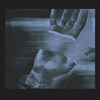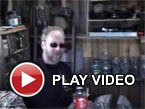FNS
 Frederik Sevendal has been a fixture in Oslo's experimental music scene for years, establishing himself as both an excellent guitarist and an imaginative purveyor of twisted Lynch-ian ambiance. His latest release, a mixture of old and new recordings, captures him seamlessly blending brooding Badalamenti-esque dread, drugged folk jangling, and strangled guitar noise into a very unique and disquieting (yet unexpectedly melodic) whole.
Frederik Sevendal has been a fixture in Oslo's experimental music scene for years, establishing himself as both an excellent guitarist and an imaginative purveyor of twisted Lynch-ian ambiance. His latest release, a mixture of old and new recordings, captures him seamlessly blending brooding Badalamenti-esque dread, drugged folk jangling, and strangled guitar noise into a very unique and disquieting (yet unexpectedly melodic) whole.
This album is Sevendal's first widely available solo work, following a slew of very limited releases, collaborations with folks like Acid Mothers Temple's Makoto Kawabata, and appearances in an eclectic array of Norwegian bands.For the most part, this release is composed of material from a CDR released on Clearsnare in 2005.However, this newest incarnation boasts some much cooler artwork and a presumably improved sound, as Deathprod’s Helge Sten took on remastering duties.More importantly, it is augmented by quite an excellent and epic new piece.
Sevendal fits quite comfortably into Miasmah's tradition of murky, low-key surrealism, but also proves himself to be one of the most varied and compelling artists on their impressive roster.While the bulk of the album is compromised simply of guitars and contains a significant amount of improvisation, it is nevertheless a meticulously textured, structured, arranged, and well thought-out affair.The album's opening piece, "Silence to Say Hello," is one of the strongest showcases for those organizational talents, as its relatively straightforward progression of strummed minor chords spends its entire ten-minute running time subtly shifting and twisting while still relentlessly increasing in ominousness and power.Throughout it all, Frederik uses the foreground to unfold a blurred melody with heavily delayed guitars and a xylophone, but gradually draws attention away from it by sneakily increasing the violence and heft of the low-end strumming and adding fleeting high-end snatches of backwards guitar and some supremely heavy wah-wah snarling in the periphery.
To his credit, Sevendal doesn't repeat himself at all as the rest of the album unfolds, though things get a bit simpler at times.The second piece,"Sappélur," is a space rock-damaged foray into drone with howling abused guitars, while the third song is a virtuosic acoustic guitar workout with an eerie nimbus of feedback and spectral warbling by guest vocalist Inga-Lill Farstad (from the colorfully named Children and Corpse Playing in the Street).Then the next three songs are quite different from those, aside from the fact that they are quite good and maintain a similarly dark, narcotic, and dreamlike haze.Sevendal even takes the microphone for "Dreams," but only to deliver some warped backwards vocals (the dwarf from Twin Peaks perhaps being a key influence).
The album admittedly has some minor flaws, as a few songs go on too long and I wish the ratio of "gnarled, howling catharsis" to "languid melancholy" leaned a bit more heavily towards the former, but this is still a very satisfying and likable release—especially "I Think She’s Asleep."I hope this makes enough of a splash to get some other FNS albums released outside of Norway, particularly since the sole new piece, 2009's "Flaggermusvingers Vift I Dimmet," completely steals the show, sounding like Sonic Youth dropped by the studio to join Soundtracks For The Blind-era Swans for a monster jam.It's a little more conventionally "rock" than the preceding pieces, but betrays that a significant leap forward in both focus and immediacy took place between the original Clearsnare release and Sevendal's current work.
Samples:
 



